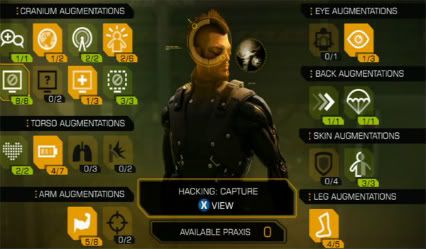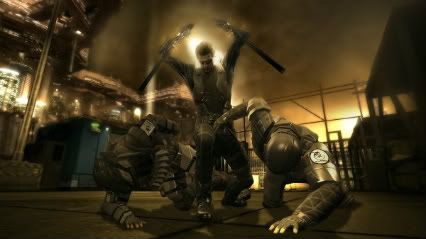
- Format: PC (version reviewed), PS3, Xbox360
- Unleashed: Out Now
- Publisher: Square Enix
- Developer: Eidos Montreal
- Players: 1
- Site: http://www.deusex.com/
The first Deus Ex game appears frequently in people’s favourites lists due to being far ahead of its time and giving players an experience that genuinely changed based on how you played. The second Deus Ex game for many people never happened. Now after a long hiatus Eidos Montreal has taken on the task of giving people a new DX game that new and old players alike will be happy with.
Deus Ex: Human Revolution is set in the year 2027. You play as Adam Jensen, the security chief of Sarif Industries which is one of the market leaders in augmentation development. The tone is quickly set that the running theme of the world (set 25 years prior to the first DX game) is that there are two camps: those who believe augmentation (the process of altering people to do superhuman things whilst also helping the disabled or war wounded) is acceptable and those who do not.

The game’s tutorial takes the form of an attack on Sarif Industries in which Adam is mortally wounded, and is saved only though extensive augmentation. Returning to work six months later he’s out to find the mercenaries responsible for the attack and unravel a web of convoluted conspiracies that takes him through the streets of Detroit to China and back again.
The game is largely played in the first person and offers up a fairly large selection of weapons and potential upgrades through XP gain that let you choose how to approach any given situation. There isn’t enough inventory space or upgrade points (Praxis Points) to have everything, so you do have to stick with your favourites.
The general theme of each problem thrown Adam’s way is that there will be a diplomatic solution, a stealth solution and an aggressive Halo player solution. XP towards your next Praxis is awarded not only for taking down enemies but for general exploration and discovery – which in itself is slightly exploitable as you can kill all the enemies in an area and then explore to your heart’s content. For those after a real challenge it is also possible to get through the game without killing a single enemy (bosses excluded).

As well as augmenting yourself to be able to fall from any height, run silently, read people’s emotions, see through walls, launch tiny explosives in every direction or preform a lethal or non-lethal take down on unsuspecting enemies, you can also find upgrades for weapons – such as allowing your assault rife to fire bullets which track targets around corners, or causing your revolver to fire explosive rounds.
Being free to tackle a problem in a variety of ways is one of the key gameplay elements that make the Deus Ex games such a joy to play. However certain aspects can get tiring and repetitive. There will always be a vent you can sneak in or a wall you can punch through or a panel to hack. This is clearly because Eidos did not want to punish the player for taking a particular upgrade route, but as a result also makes it ridiculously easy for the player favouring stealth.
The preference for stealth is also fairly strong due to Adam being shockingly fragile – even if you invest in the augments which decrease damage taken. Being quickly wounded and slow to regenerate health was probably to encourage using up inventory spaces on expendable items like energy bars and drinks which give temporary health, or restore the bar expended through the use of the more powerful augments.

Frankly though you rarely need to worry about being shot. Confusingly the enemy AI is smart to the point of being rendered stupid. Yes they are incredibly accurate, and if you are discovered will rain down bullets on your last known position with vigour; but it rarely occurs to them to push in on you or that you might have moved, making them ridiculously easy to dispatch from behind. They also give up searching for you in the ‘alarmed’ state far too easily – even if they are surrounded by the bodies of their former colleagues they will still occasionally mutter “Must have been nothing…”
The music in DX:HR is a high point. Reminiscent of the original game’s score, each track will blend well with what the player is doing and tug at the nostalgia strings of those who played the previous games. The voice acting on the other hand is largely awful and while not as stereotypical and racist as the first game, does borderline on bad taste at times.
Getting through the plot of DX:HR and doing most if not all the side missions will take you just over twenty hours. There are quite a few twists on the way, none of which are surprising if you’re paying attention. While the story culminates in a rather unsatisfying choice of endings (which may also be the first ever examples of endings which deal with consequences on such a large scale that they forget to deal with the characters in the game) the journey there is still a lot of fun.
An unsatisfying conclusion and fairly predictable plot aside, it is hard to pin-point anything that would put someone off – unless too many small nit-picks mentioned above when combined together sour the overall experience for the player. Deus Ex: Human Revolution has these niggling flaws and yet the bottom line is that we still enjoyed playing through the game. However, those looking for the perfect experience will need to continue the search.
















Comments